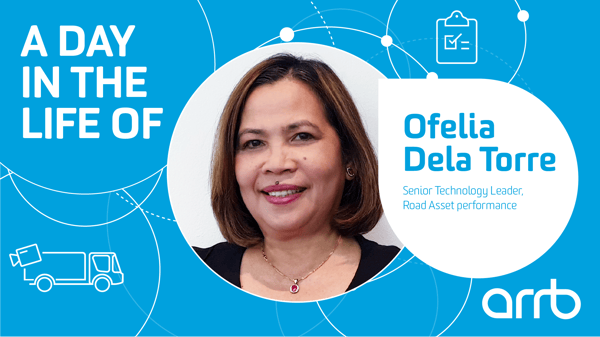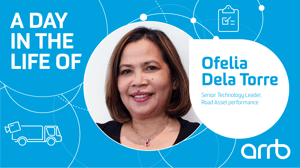We're giving you an insight into what life at ARRB is like.
We will be covering the stories of several ARRB employees in the different Strategic Working Groups. Today, we have Ofelia Dela Torra from our Road Asset Performance team.

What does a day in your life look like?
As a mother of three, grown up children I am free of the morning rush to get kids ready for school. However, everyday I wake up around 5:30am to get ready for work.
I drive my sleek, sporty Toyota CHR every morning to Seven Hills train station at 6:30am so I can get a parking spot at the “Park and Go” parking which was designed by one of ARRB’s former employees, Michael Moses. Almost every morning I park in the same spot, then I catch the train to the city. Before Covid, I am sure that at 6:30am I will always have a seat on the train. The Sydney office is a nice, 10-minute walk from the station.
My day is a mixture of everything, it could be an internal meeting within my Data Processing Team or with another team, a call from a client asking for a quote/proposal for FWD, NSV or Dilapidation surveys, a call from anyone asking for help. Most of the time I spend my day in meetings or telephone calls but on top of this I have deadlines to catch up with, or reports and results to be finalised and delivered. I also try to find time to look at our data processing methodologies and how we can improve or automate some of the steps.
On top of my busy days, one thing I can assure you is that I always have time to laugh and tell stories and jokes on my lunch break with friends. I remember during my first two weeks in the Sydney office, I ate lunch alone so that I could talk to my friends on the phone and we would start laughing. I was a bit embarrassed when everyone started checking the lunch room as they thought there were group of people laughing, but when they looked it was just me.
Before my day ends, I make a list on what to do the following day and then I walk to the station again. Before Covid, I would never get a seat on the train. When I get home, I will sometimes continue working but when I'm done, I enjoy looking at Tiktok to decompress.
What made you decide to get into your field?
Since I was six years old, whenever anyone asked me “what do you want to be when you grow up?” I only had one answer: I want to become an engineer! Everyone, including my family, thought I was only dreaming an impossible dream because an engineering degree is one of the most expensive degrees. There’s no HECS or educational loan in my originating country (The Philippines) so tuition fees had to come from your parents' pocket.
I came from a very poor family with 12 siblings and my father was a farmer and my mother looked after all the children. Our harvest would depend on rain as we had no water irrigation and sometimes we can barely ate three meals a day. When I was a teenager, “Poverty is not a hindrance to success” became my motto. I completed high school as Salutatorian. The nearest university was over 100km away from home which would take 3 to 4 hours on a bus! My fear came to realisation as my parents couldn't afford to send me to university. My desire to become an engineer was strong though, and I managed to self-support my studies. I worked at the university in the morning and attended my classes late in the afternoon until evening. Despite this hardship, I did very well and even received a scholarship while I continued working to pay off my tuition. And now, here I am, my dreams came true!
After completing my Bachelor of Science in Civil Engineering with honours, I worked in the city government and became the Maintenance Engineer. This position made me strong and taught me to be tough in my job as I managed approximately 200 employees who were working or fixing the roads.
My children knew that my job was to fix the roads to enable them to have a smooth ride. One thing I will never forget was while driving my car with my children one day, our car was bouncing due to the potholes and severe cracks in the road, they asked me why I didn’t fix the potholes to have a smooth ride? I felt ashamed as I do my best to manage the budget to fix the roads.
When I arrived in Australia, I was amazed at how big and smooth the roads were, especially on the highways. I started my work here in Australia as a data technician collecting various types of data, then I progressed to a data analyst processing various types of data from different equipment, then finally as a project engineer working closely with local government agencies.
My career progression from the ground up, gave me a full understanding on how to collect, process and analyse data. I am always seeking new ways to use and expand my skills and how I can assist others especially local governments.
What are your favourite and least favourite parts of your job?
My favourite part of my job can be summarised:
- When my client is happy and meets their expectations.
- When I win a project whether big or small.
- When my project is executed according to plan.
- And many others!
Name a career highlight of yours
Becoming a Chartered Professional Engineer which was more than five years in the making. And recently, receiving the ARRB Collaborative Award for 2020 which I consider as one of my career highlights, as it is a living testimony of my hard work.
What advice would you give for someone wanting to work in the industry?
- Love your work, be positive and be open minded.
- Don’t be shy to show to the team or organisation what you can do, have the attitude of “just give it a go”. I also remember a phrase from Dr Michael Moffatt, a colleague of mine at ARRB, which inspires me; “You can truly write your own destiny at ARRB.” Working with one organization for a long time doesn’t mean that your knowledge becomes stagnant as you can move around, explore or use your skills and knowledge in different Strategic Working Groups within ARRB.
- Be patient, don’t give up until your voice is heard.
Read about the lives of other ARRB staff here:
